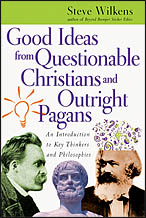Good Ideas from Questionable Christians and Outright Pagans introduces the reader to at least one very important idea from each of ten of the most important philosophers through history: Socrates, Plato, Aristotle, Augustine, Aquinas, Descartes, Kierkegaard, Marx, Nietzsche, and Sartre. Philosophers and their ideas are presented chronologically so that the reader grasps the progression of thought over the centuries.
Writing for a Christian audience, author Steve Wilkens is clear that we are unlikely to agree with all of the ideas of any of these thinkers, yet he points out that even pagans and those who might be on the margins of Christianity can come up with good ideas. So he selects one or more of those good ideas from each philosopher to examine in each of the book’s eleven chapters. Wilkens explains the philosopher’s justification for his idea, helping the reader understand the concept’s positive aspects. He concludes each chapter by dissecting the idea—pointing out arguments or evidence for and against it. Wilkens sometimes brings in other aspects of the philosopher’s thinking or lifestyle that help us better understand each one’s line of thought.
Socrates, Plato, and Aristotle get more attention than do some of the other philosophers as Wilkens uses the first four chapters (two on Socrates!) to lay the groundwork for philosophical thought. He begins by introducing the importance of definitions. In a unique twist, Wilkens first addresses the meaning of holiness and truth using Socrates’ dialogues from Euthryphro and Theaetetus. This approach helps the reader grasp the importance of definitions with concrete examples while also addressing very important philosophical questions about holiness and truth. This first chapter also introduces the “Socratic dialogue.” Wilkens “dissects” the Socratic method at the end of this chapter.
Socrates introduces so many important philosophical ideas that he is given a second chapter in which we consider whether or not beliefs or worth dying for—really an examination of whether or not there are eternal, objective truths and whether or not we can be confident in our “discovery” of them.
The third chapter explores Plato’s Republic, considering Plato’s ideas of truth, goodness, and beauty, and the reality of the soul. Wilkens points out the commonalities that Christian thought shares with Plato as well as the differences that arise because of Plato’s reliance on human reason alone.
Chapter four examines Aristotle’s ideas about happiness while also looking at ethics and virtue. The fifth chapter tackles the question of evil through the lens of Augustine of Hippo, and the sixth chapter asks whether nature can lead us to God by considering the ideas of Thomas Aquinas.
With chapter seven, Wilkens begins his exploration of ideas that have led in directions contrary to Christian philosophical views.
Chapter seven offers an excellent explanation of why Descartes’ questions about the certainty of our knowledge turned out to be hugely influential, especially for those who preferred to rely on reason rather than faith. Chapter eight puts a rather positive spotlight on Kierkagaard as Wilkens explains why Kierkagaard thought it necessary to separate faith and logic. In chapter nine, we consider the role of economics in philosophy as we examine Karl Marx’s claims about economics and the idea of class struggle as an explanatory model.
As many philosophers continued to move in the direction of atheism, we encounter Nietzsche and his rejection of traditional morality in favor of the “will to power.” Finally, Wilkens introduces Sartre and his existentialist ideas as a natural outgrowth of a coherent atheist philosophy that views God as nothing more than a construct of our imaginations. There is an underlying logical development of the ideas posed as chapter builds up on chapter. Wilkens entices his readers by posing the ideas as questions—using the Socratic method to help his readers think with him through the ideas. By the end, the reader should have a fairly clear understanding of some of the most important philosophical ideas and their impact upon culture as well.
Wilkens’ approach differs from some Christian writers tackling philosophy at an introductory level because he makes a fair presentation of each philosopher’s ideas, actually sounding much like an advocate on their behalf through most of each chapter. When he “dissects” each philosopher, he respectfully points out faulty logic and other challenges that might be raised, especially from a Christian point of view.
Good Ideas makes an excellent starting place for those new to philosophy. For those who have already been introduced to philosophy through the typical college Philosophy 101 course, Good Ideas should serve well as an enjoyable review from a different slant. While the book seems to be written for a college and adult audience, older teens (junior and senior levels in high school) should find it accessible.
Good Ideas should be particularly helpful for understanding worldviews since the answers to the ultimate questions such as those raised in this book about God, reality, love, reason, and faith shape all worldviews. Because of this, Sonlight uses Good Ideas as one of the core books in their History 520 World History and Worldview Studies course for eleventh and twelfth graders. Using it within the context of that course provides discussion questions and helpful notes.










